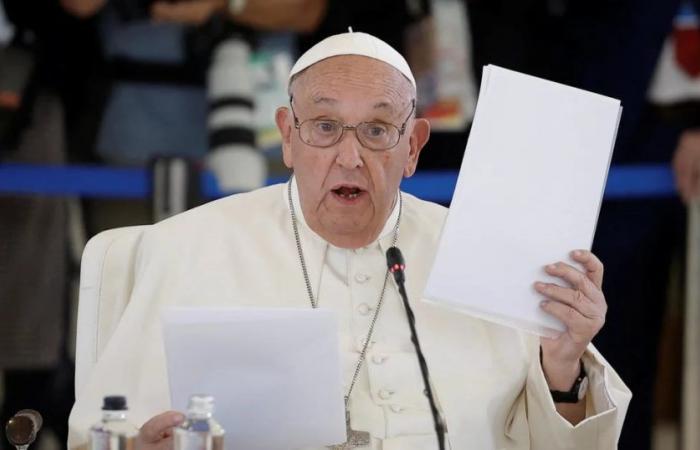He Pope Francisco He is an octogenarian who says he can’t use a computer, but on a February afternoon in 2019, a senior American Big Tech diplomat entered the papal residence seeking guidance on the ethics of a developing technology: artificial intelligence.
The president of Microsoft, Brad Smithand the Pope talked about the rapid development of technology, Smith said in an interview with Washington Post, and Francisco seemed to understand its risks. When Smith left, the Pope issued a warning. “Keep your humanity”he urged as he grabbed Smith’s wrist.
In the five years since that meeting, AI has become inevitable, as the Pope himself discovered last year when viral images of him wearing a Balenciaga jacket heralded a new era of fakes. And as the technology has proliferated, the Vatican has positioned itself as the conscience of companies like Microsoft and emerged as a surprisingly influential voice in the debate over global AI governance.
On Friday in southern Italy, Francis became the first pope to address a forum of world leaders from the Group of Seven. delivering a moral treatise on the “cognitive-industrial revolution” that AI representsin an attempt to elevate the issue in the same way he did with climate change.
In a wide-ranging speech, the Pope outlined the ramifications of a technology “as fascinating as it is terrifying”, saying it could change “the way we conceive of our identity as human beings.” He denounced that AI could consolidate the dominance of Western culture and undermine human dignity.
AI, he said, is presented as a tool that could democratize knowledge, advance science “exponentially” and alleviate the human condition as people cede “arduous tasks to machines.” But he warned that it also has the power to destroy, and called for an “urgent” ban on lethal autonomous weapons. As a ghost from the future, he referenced the 1907 dystopian novel “Lord of the World,” in which technology replaces religion and faith in God.
“No machine should ever choose to take the life of a human being.”said the Pope.
He has already insisted that AI risks must be managed through a global treaty, and on Friday he endorsed the need for a set of unifying global “principles” to guide AI development.
The “Rome Call for the Ethics of Artificial Intelligence” – a document that counted the Vatican, Microsoft and IBM among its original signatories in 2020 – is becoming the gold standard for AI best practices. It has served as the basis for G-7 discussions on the development of a code of conduct. And on Friday, G-7 leaders – with support from the Vatican – announced they would create a badge of honor of sorts: a new label for companies that agree to develop AI tools safely and ethically and follow guidelines for voluntary risk reporting and monitoring. Echoing the Vatican’s concerns, the leaders further called for “responsible military uses of AI.”
The AI issue has provided an opportunity for the Church, diminished by its handling of clerical sex abuse scandals, to reassert its moral authority. Microsoft and at least some other tech companies appear eager to get the Church’s seal of approval, as the industry faces the public relations challenges of a technology that could automate jobs, amplify misinformation and create new cybersecurity risks. .
The Vatican has earned a place at the table of big technologies. An ancient institution with an uneven history in the field of science – see the trial of Galileo – now sends representatives to major technological events.
The priest Paolo Benanti – the Vatican’s leading expert on Artificial Intelligence, a Franciscan priest and engineer by training who is credited with coining the term “algoretics” – last year secured a position on the United Nations Advisory Body on Artificial Intelligence and has become an important player in the development of a national Artificial Intelligence policy for Italy, a G-7 country. At the request of the Vatican, IBM hosted a global summit of schools at the University of Notre Dame to put AI ethics at the forefront of curricula.
The opinions of the Vatican have influenced specific business decisions. Microsoft’s Smith told the Post: “We developed our own technology that would allow anyone, in just a few seconds, of anyone’s voice to be able to replicate it. And we decided not to disclose it.” The Rome principles, he added, are “certainly part of what has helped us at Microsoft strive to take a broad approach to AI development, even within our own four walls. I think it has provided us with a broad humanistic and intellectual framework.”
The commitment’s emphasis on inclusion also influenced the company’s decision to launch a fellowship that brings together researchers and civil society leaders, mostly from the Global South, to evaluate the impact of the technology, he said. Natasha Crampton, director responsible for Artificial Intelligence at Microsoft. The interns have helped the company develop multilingual assessments of AI models and ensured the company understands local context and cultural norms when developing new products.
Not all companies agree with the Rome principles. Some have gone ahead with AI-manipulated audio that researchers warn could be used to mislead voters before the election.
Nor has everyone been allowed to join the Rome club. The Chinese company “Huawei asked”, said the archbishop Vincenzo Paglia, president of the Pontifical Academy for Life. “And we said no, because we don’t really know what they think [los responsables de allí]”.
Meanwhile, the Vatican remains concerned about the misuse of open source AI. The technology could produce big benefits in healthcare and education, Benanti said. “But it can also multiply many bad elements in society, and we cannot spread AI everywhere without any political decision, because tomorrow we could wake up with a multiplier of inequality, of biological weapons,” he said.
Vatican officials have already sounded the alarm about what they consider potentially unethical usesincluding facial recognition systems deployed in the crackdown on protesters in Hong Kong in 2019-2020, as well as algorithms for refugee processing such as those in Germany, where AI-powered linguistic tests have been used to establish whether asylum seekers They lie about their place of origin.
The relationship between the Vatican and AI innovators had its genesis in a speech Benanti gave in 2018 on the ethics of AI. A senior Microsoft representative in Italy had been in the audience, and the two began meeting regularly. They brought in Paglia, who was interested in expanding the scope of his scholarship beyond core topics such as the ethics of stem cell research.
Before Smith’s visit to the Pope, Paglia accompanied him to see Michelangelo’s “Last Judgment” in the Sistine Chapel and showed him Galileo’s representations of the Earth revolving around the Sun, a theory that earned him house arrest for life. after an ecclesiastical trial.
However, The Vatican’s relationship with science has not always been Luddite. In the Middle Ages, Catholic scholars planted Europe with what would become some of its greatest universities. And although some clerics targeted it, Darwin’s theory of evolution was never officially questioned by the Vatican.
The Church officially declares that “faith and reason” are not in conflict.
“The Bible does not tell us how heaven works, but how to get there”Paglia said, quoting Galileo. The archbishop has made official trips to Microsoft’s headquarters near Seattle and IBM’s offices in New York.
Thanks to its aggressive investments in artificial intelligence, Microsoft has become the most valuable company in the world, worth more than $3 trillion. But its continued success depends on curbing negative perceptions of AI. Concerns that this technology could displace jobs, exacerbate inequalities, enhance surveillance and usher in new types of warfare are leading governments around the world to consider strict regulations that could curb the company’s ambitions.
The European Union is preparing a historic law that could limit more advanced generative AI models. The Federal Trade Commission is investigating a deal Microsoft struck with AI startup Inflection, to determine whether the tech giant deliberately staged the investment to avoid a merger review. And US authorities have reached a deal that will expose the company to greater scrutiny over how it wields its power to dominate artificial intelligence, including its multibillion-dollar investments in OpenAI, maker of ChatGPT. That relationship has also exposed Microsoft to new reputational risks, as OpenAI CEO Sam Altman frequently invites controversy.
Under Smith’s direction, Microsoft has created one of the most sophisticated lobbying organizations in the world to defuse its regulatory problems and try to convince people that it is the technological titan the world can trust to create AI. Smith regularly meets with heads of state, and last month he attended the inauguration of a factory with President Biden. To be an effective company, Microsoft has to find ways to work with governments and ensure its technology can transcend them, Smith said.
The “world’s oldest global organization” can be a teacher and a unique partner in that effort, he said, referring to the Vatican. Catholicism and other religions are not subject to national borders, nor are the applications that Microsoft sells around the world.
“On the one hand, you might think we are strange bedfellows,” Smith said. “But, on the other hand, It is a perfect combination.”
© 2024, The Washington Post






